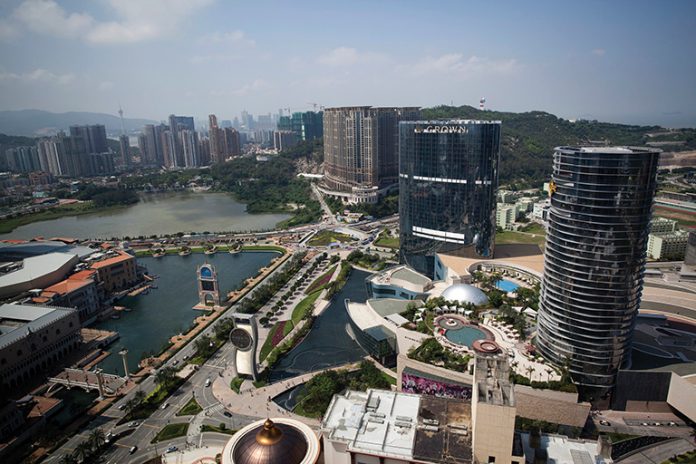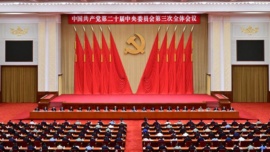The Macau SAR government announced today (Tuesday) the launch of the public consultation for a revised gaming law that proposes for the current sub-concession system to be removed, for government delegates to be designated to oversee gaming operators and for a new illegal deposit crime to be created.
The public consultation for the new gaming law will take place from September 15 until October 29, with five sessions for the general public and one for members of the sector.
The number of future gaming concessions has not been defined in the public consultation document or the proposed duration of the concessions.
Authorities propose an increase of legal requirements for oversight of concessionaires, suitability evaluation, worker guarantees, non-gaming elements, concessionaires social responsibility, and their criminal responsibility.
The draft was presented today in a special press conference with the presence of Secretary for Economy and Finance Lei Wai Nong and Gaming Inspection and Co-ordination Bureau (DICJ) Director Adriano Ho.

“After the handover of Macau, authorities implemented the 2001 gaming law as a fundamental law to regulate the gaming sector. After a 20-year development process the gaming sector grew at a dazzling speed and contributed to evolving the local economy and the lives of residents, becoming a cornerstone of the local economy,” Lei said.
“However, this also generated other issues […] considering the huge changes in Macau in terms of society and economy the Macau government decided to proceed with a review of the current legal framework”
In 2019 the city reported MOP292.4 billion in gross gaming revenues but in 2020, due to the impact of the pandemic, that number that dropped 79.3 per cent year-on-year.
In the first half of this year, revenues reached MOP49 billion, 25 per cent less than the amount forecast by the government.
With gambling representing about 80 per cent of government revenues and 55.5 per cent of Macau’s GDP, authorities are suggesting policies to drive the SAR away from its ‘gaming dependence’, with the gaming sector itself having to assume a ‘leading role’ in driving the diversified and sustainable development of the local economy.
The new gaming law document proposes that given the current dimension the Macau SAR government will proceed with the study and revision of the number of gaming concessions to be attributed, but with the current status of a sub-concessionaire to be prohibited.
Only three gaming concessions were granted during the 2002 casino liberalisation process to SJM Resorts Ltd, a subsidiary of SJM Holdings Ltd; Wynn Resorts (Macao) SA, a subsidiary of Wynn Resorts Ltd; and Galaxy Casino SA, connected to Galaxy Entertainment Group Ltd.
The local authorities eventually allowed each concessionaire to have a sub-concession, namely, MGM China Holdings Ltd, Melco Resorts and Entertainment Ltd and Sands China Ltd.
The current concessions are set to expire in June 2022 but can still be extended. Under current law, Macau’s gaming concessions can each be extended by up to five years, however, a three-year extension is seen as most likely given that SJM and MGM have already had their concessions extended by two years to match up with the expiry date of the other four concession holders.
Secretary Lei today only revealed that authorities which to hear society first before making a decision on the number of gaming concessions granted.
“After 20 years we can see that the sector reached a considerable scale so we need to assure its scale, but we need to consult the opinion of the residents. We do not want to propose a limit on the concessions we want only to say that a certain scale maintains,” Lei added.
“We have to maintain a small scale to assure we have the financial base […] but we cannot expand the sector indefinitely. Therefore a limit on the number of concessions is adequate”

The gaming law public consultation document only states that authorities will consider the “positives and negatives” of the current scale of the gaming industry in the last 20 years and assess the right balance.
The document also proposes that the current concession duration of 20 years and possible extra 5-year concession should be revised, but again with no proposed duration.
However, it establishes that the imposition of an ‘excessively long or inflexible concession period’ may cause a certain obstacle, ‘probably leading concessionaires to be less proactive in improving their services to attract new clients’ while indicating that the possible extra Chief Executive extension could be ‘unfavourable for attracting new investments and should be proportional to the initial concession time provided.
“There were many infrastructures constructed in the last 20 years and we need to assess the objective realities of the Macau reality, we need to match the balance the demand and offer and if the 20 year period needs to be altered,” Lei added.
The Secretary skirted away from any questions concerning the current gaming concessions and their future, underlining the press conference only centred on the current gaming law revision.
The document also proposes for the current MOP200 million in minimum registered capital of a concessionaire to be increased, considering the increase in the scale of the local gaming sector since 2021 and to assure they have the required financial capacity.
The current requirement that the management of the concessionaires is mandatorily delegated to a managing director who is a permanent resident of the Macao SAR and holds at least 10 per cent of the share capital of the concessionaire should be increased to incentivise operators to make Macau the ‘root’ and ‘centre’ of their operations.
It is also suggested that the distribution of profits to shareholders, carried out by the of the concessionaires, regardless of their form of cash or in shares, cannot be done if some requirements are not fulfilled in advance and after prior authorization from the Macau SAR Government.
Since as of 2020 a total of 82,043 people were employed in the gaming sector – 17.2 per cent of the employed population in general – authorities warned that this labour segment would be the first to face difficulties in accessing employment if the sector declined.
Therefore concessionaires will be asked to ‘constantly and proactively take steps to ensure access to the employment of local workers, including promotion measures for promotion, professional and horizontal mobility, and adequate and sufficient professional training’.
The document also proposes that people and certain positions existing in concessionaires or their managing companies, including shareholders holding equal or greater than 5 per cent of its share capital will have to carry out a suitability evaluation, including all directors and principal employees with relevant functions in casinos.
‘Concessionaires, in addition, to submitting documents and information to the Macau SAR Government, will also be required to allow the Government to access documents and information available,’ the document adds.
In order to assure the environment ‘free of criminal influence’, authorities suggest being able to check the suitability of the personnel hired junket operators, including collaborators or individuals and entities strictly related to VIP gaming promotion.
‘There were crime cases or negative problems that involved or took advantage of the gaming promotion, such as the illegal raising of capital, request for refund of game credits by illegal means, among others [ …] it is necessary to tighten regulations activities carried out by gaming promoters, such as increasing the criteria for access to this profession, the value of social capital, etc.,’ the document establishes.
A new crime covering illegal money deposits is also proposed, incurring a possible 5-year prison sentence or fine penalty to concessionaires who, on their behalf or through their shareholders or employees, accept the deposit of cash or other amounts provided by others and, because of this, pay or undertake to pay remuneration or any other form of remuneration.
“We do not want to see the previous instances of illegalities in the past so we considered a prevention mechanism to prevent crime. We want to have better oversight of junket operation and assure the sustainable development of the sector,’ Secretary Lei noted.
According to a legal advisor from the Secretary for Economy Office, Ian I Lin, the revision will clarify the responsibility held by the concessionaire in case of such illegal deposit activities.
Special government delegates will also be appointed to extend the power of direct inspection of the Macau Government over the concessionaires, providing them with greater capacities of oversight over their operations.
Concerning the possible introduction of online gaming – which is currently illegal in the SAR – in the new law Secretary Lei expressed authorities will take a “cautious approach” concerning this issue but veered towards maintaining the current legal status.
“We have to consider that any world tourism and leisure centre needs a physical presence. This is an important way to assure employment, we have to have a long term vision if we introduce online gaming, this can generate many social problems, so we think that we must have a prudent attitude towards online gaming,” he added.
Concerning any changes in the current gaming tax rate – currently of 35 per cent plus two contributions of up to 2 and 3 per cent for social and economic purposes – Secretary Lei only noted that the “gaming tax is strictly related to society and the level of life of the residents” therefore authorities would have to carefully consider any change to it.
Under the local law after the public consultation is completed a final report should be published within 180 days.
[To be updated]





















